AI SEO Case Study: $0 to $10,000/mo in 3 Months
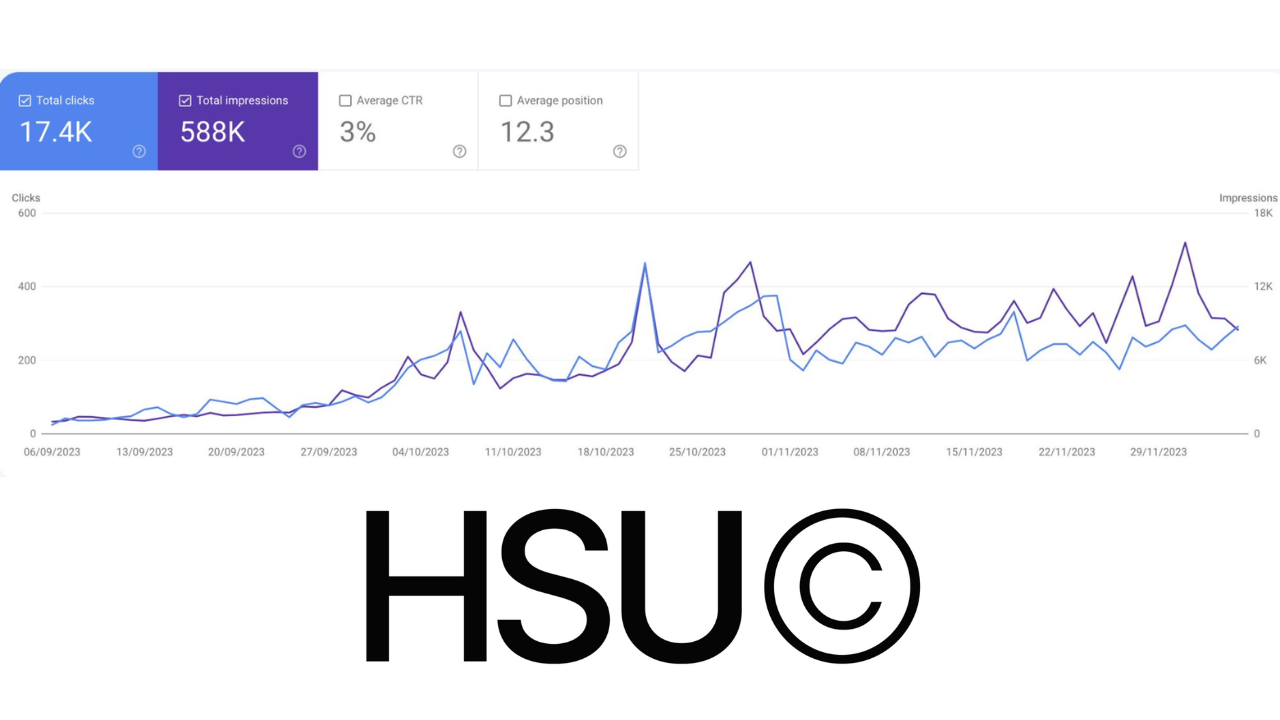
Luca, the owner of HSU Marketing agency, recently used Journalist AI to grow one of his personal sites.
The results are clear as day showing that AI content can not only rank on Google but also drive revenue to a business.

" Impressive results! "
- SEMrush, 2024
Luca shared these results on his LinkedIn page, and with such an impressive growth, even SEMrush commented on Luca's post. Take a look:
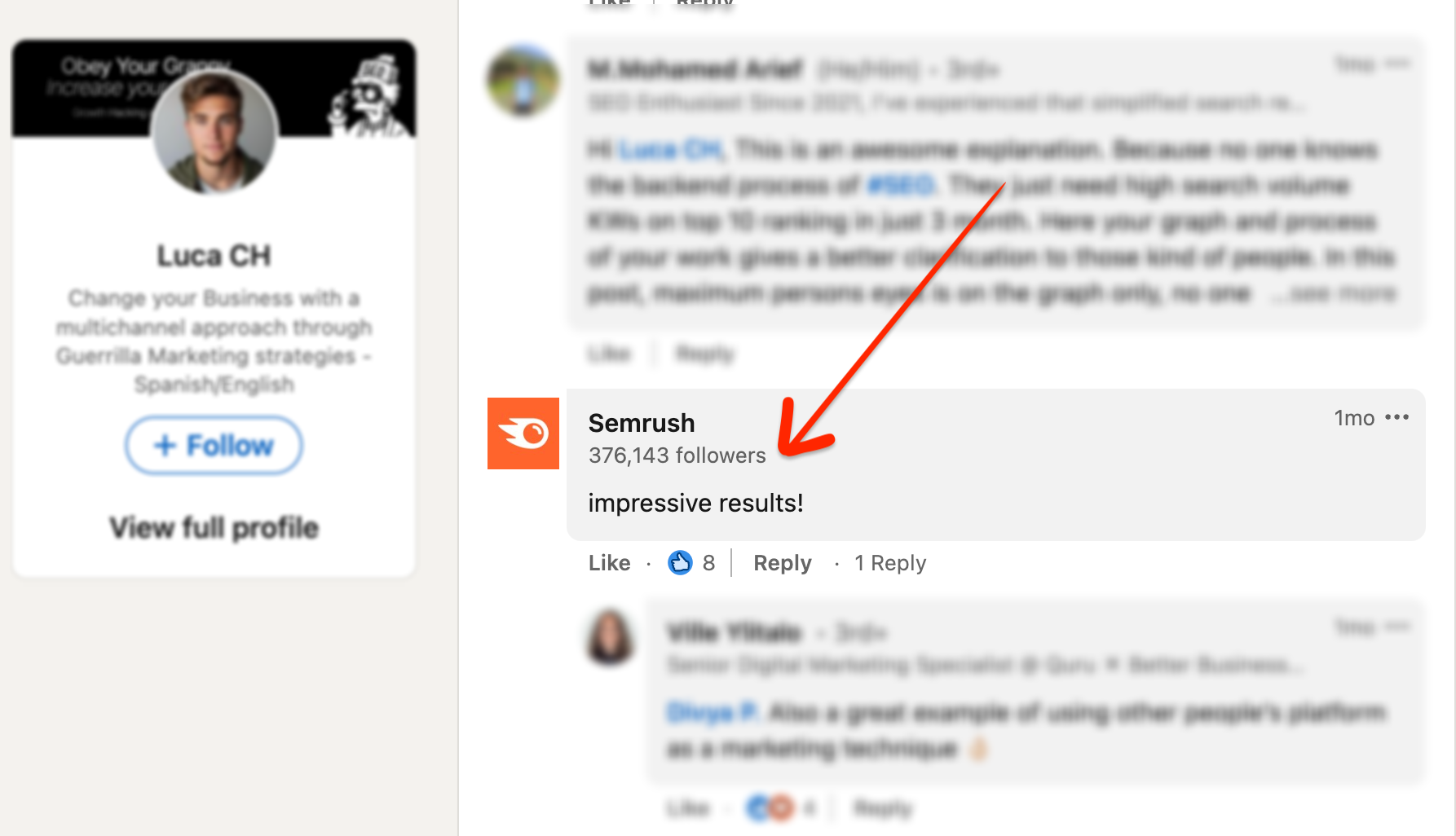
Furthermore, SEMrush data shows us the quick increase in both organic traffic and subsequently in organic keyword rankings.
Most of the keywords Luca targeted using Journalist AI were "buyer-intent" - meaning people searching for them are more predisposed to buying than ones searching for "non-buyer intent" keywords.
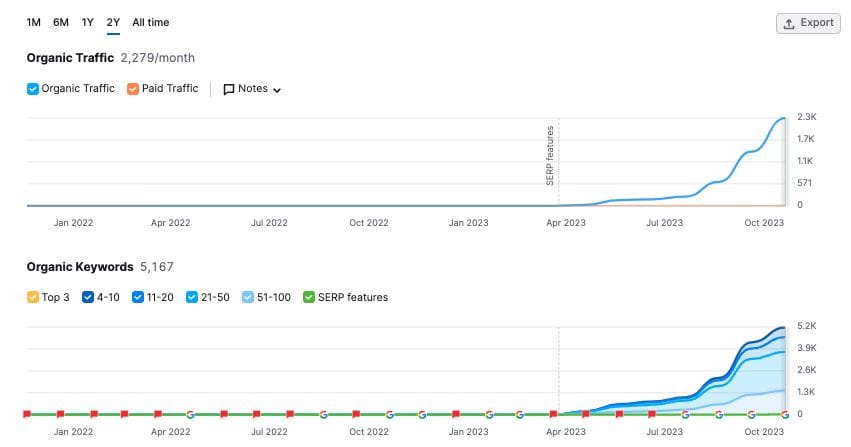
Publishing Content that Drives Sales
One of the key takeaways from this case study is the importance of focusing on content that drives revenue.
Many SEO strategies fail to yield significant financial results because they focus on non-profitable or non-converting keywords (i.e. non-buyer-intent keywords).
By honing in on keywords that address customer pain points and questions, and by optimizing for conversions rather than just traffic, Luca was able to deliver substantial business growth for his client - all while leveraging Journalist AI
The video below goes over this case study, diving in the intricacies a bit further:
AI SEO Case Study: Video Overview
How It Started
In August 2023, Luca began working with a new client.
The primary goal was clear: to significantly boost the client's online presence and revenue through effective SEO strategies.
The challenge was to achieve tangible results rapidly, in a landscape where patience is often considered key.
$0 to $10,000/mo in 3 Months
Luca demonstrates that with the right strategies, substantial growth can be achieved in as little as three months.
The strategy outlined below delves into the details of this remarkable case study, where a client experienced a surge from $0 to $10,000 in Monthly Recurring Revenue (MRR) within just a quarter.
Leveraging Journalist AI for Automation
By leveraging Journalist AI's automation systems, Luca had the ability to test multiple things and produce content at an extremely fast pace.
This level of automation was part of the reason why he succeeded so quickly. The image below shows some of the automated systems he implemented:

Here's a detailed overview of what Journalist AI helped automate:
- Keyword Research (fully automated with Journalist AI - here's how)
- Wordpress Integration (Journalist AI integrates with Wordpress, Wix, Blogger, Webflow, Ghost, Zapier, and a dedicated API)
- Content Generation (based on the prior Keyword Research)
- Content Publishing (a mix of manual and automated publishing via the autoblogging feature)
- Syndication to Social Media
Strategy and Implementation
Luca's approach was multi-faceted, focusing on both innovative and proven SEO techniques. Here's a breakdown of the strategies employed:
- Programmatic SEO: This approach, which doesn't require coding, was pivotal in scaling the client's SEO efforts efficiently.
- Deep Keyword (KW) Research and Content Categorization: By thoroughly understanding and categorizing relevant keywords, the content was tailored to meet specific user intents
- SEO Title/Meta Optimization: Simple yet effective, this involved integrating main keywords into titles and optimizing landing pages to align with user intent.
- Hreflang Implementation: To cater to a diverse audience, multiple languages were incorporated, enhancing global reach and relevance.
- Comparison Pages: These were implemented to boost pages that generate real conversions, a key focus of the strategy.
- Focus on High Converting Keywords: Instead of chasing high-volume keywords, the strategy centered on those with a higher likelihood of conversion. This included:
- Comparisons and Alternatives
- Customer Pain Points Combined with Keywords
- Questions related to customer problems
- Utilization of Hotjar: This tool was instrumental in improving user experience, guiding visitors more effectively towards conversion actions, and making the site more user-friendly and engaging.
Journalist AI helped him with automating keyword research, generating and automatically publishing content to the client's site.
How to Replicate This Case Study
The first think you need to know is that AI blog posts alone aren't enough.
You need to:
- Understand and implement Technical SEO
- Understand and implement On-page SEO best practices
- Know exactly what keywords to target (i.e. buyer-intent keywords)
- Understand and implement Off-page SEO (i.e. link building)
These are simple concepts to understand, but not easy to implement
Technical SEO Best Practices
Starting with Technical SEO, here's what you need to optimize for:
- Meta Title/Meta Description
- Headings (H1, H2, H3...)
- Schema Markup
- Body Content
- Image optimization
Here's a step-by-step 11-minute video showing you how to implement all the basics of technical SEO:
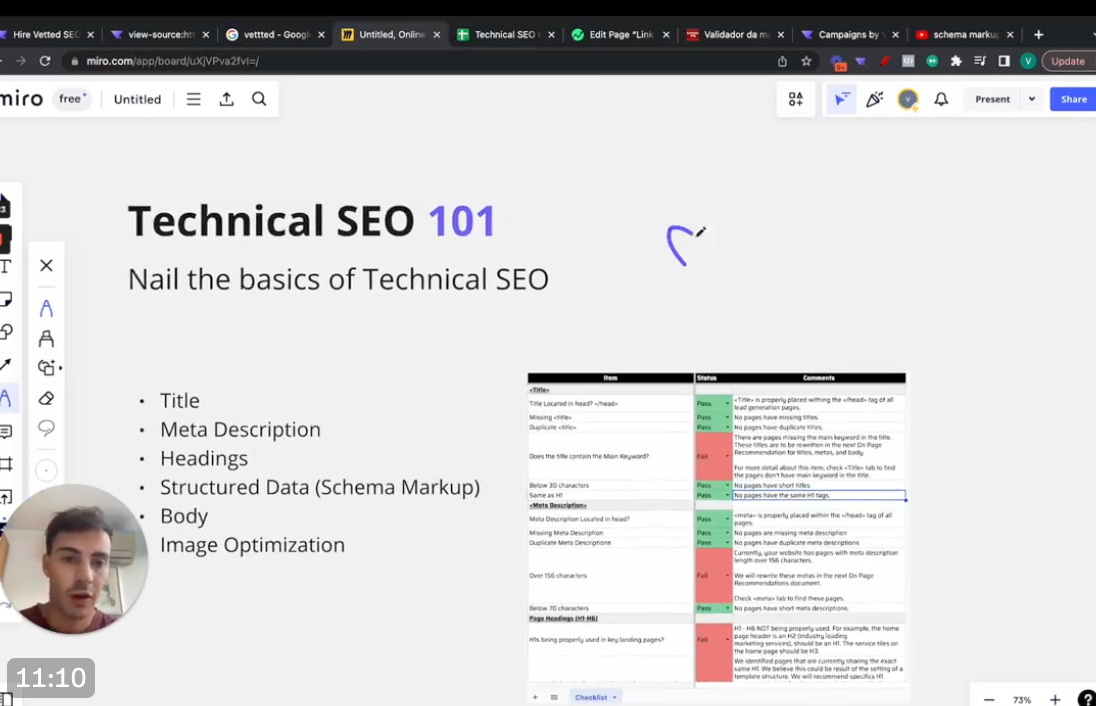
Implementing On-page SEO
After you tackle technical SEO, it's time to focus on On-page SEO.
I can't stress how important this is. On-page SEO involves optimizing the following:
- Headers (H1, H2, H3... optimization)
- Readability
- Visual content (e.g. in-article images, videos, tables, bullets, quotes etc..)
- Internal linking & external linking (here's how to automate linking)
- Content body
Here's a short video with 5 tips on how to make sure you have proper On-page SEO implemented on your site:
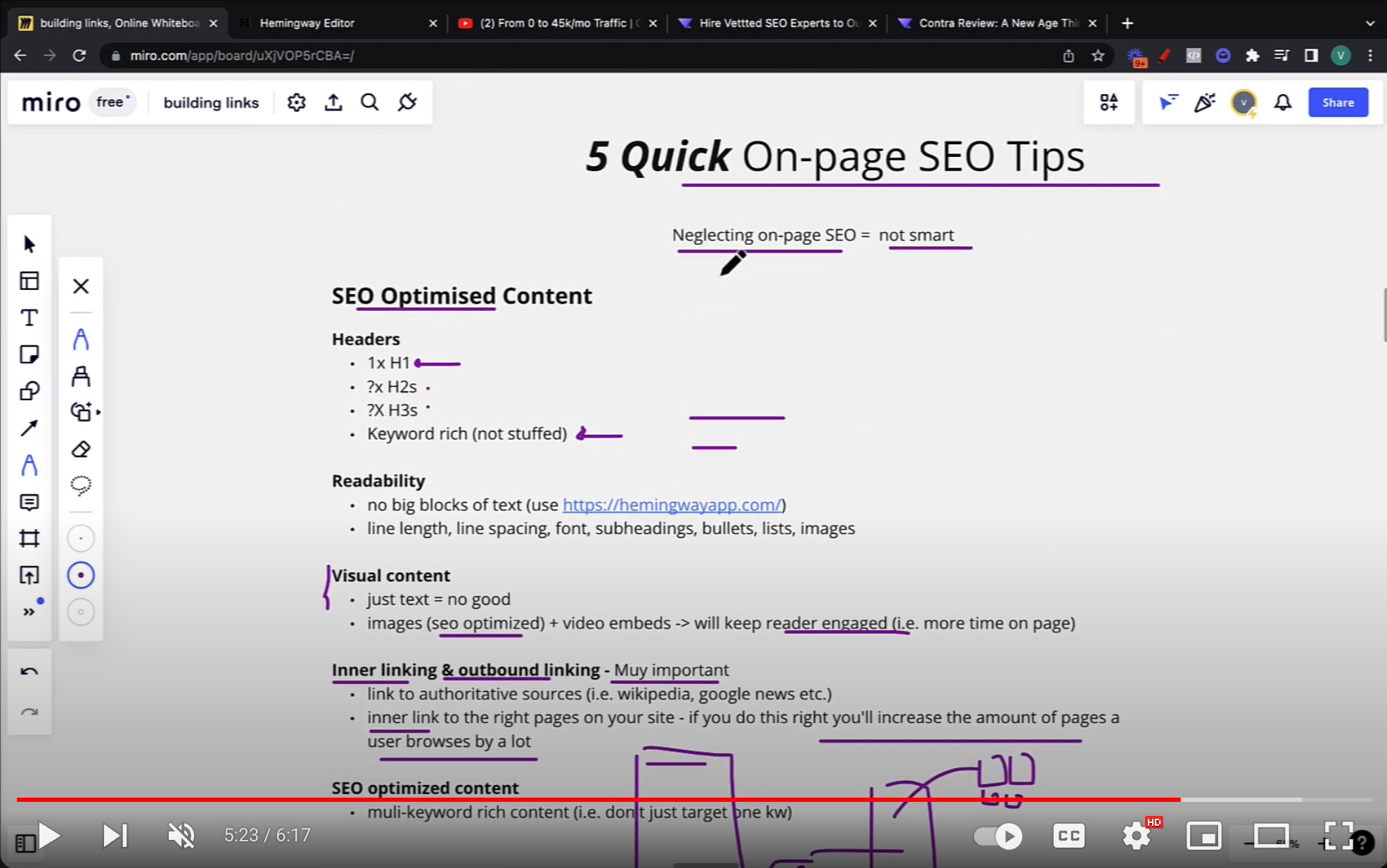
Keyword Research (Finding "Money" Keywords)
After you tackled technical and on-page SEO, it's time to find the right keywords to rank for (ideally this would be your first step).
This is usually the most boring part for people, however, it's probably one of the most important steps. The good thing about this process, is that Journalist AI now automates keyword research for you.
That said, it's still important you understand how keyword research works before working on automating it with AI.
The video below is a step-by-step tutorial on keyword research (how and why to do it):
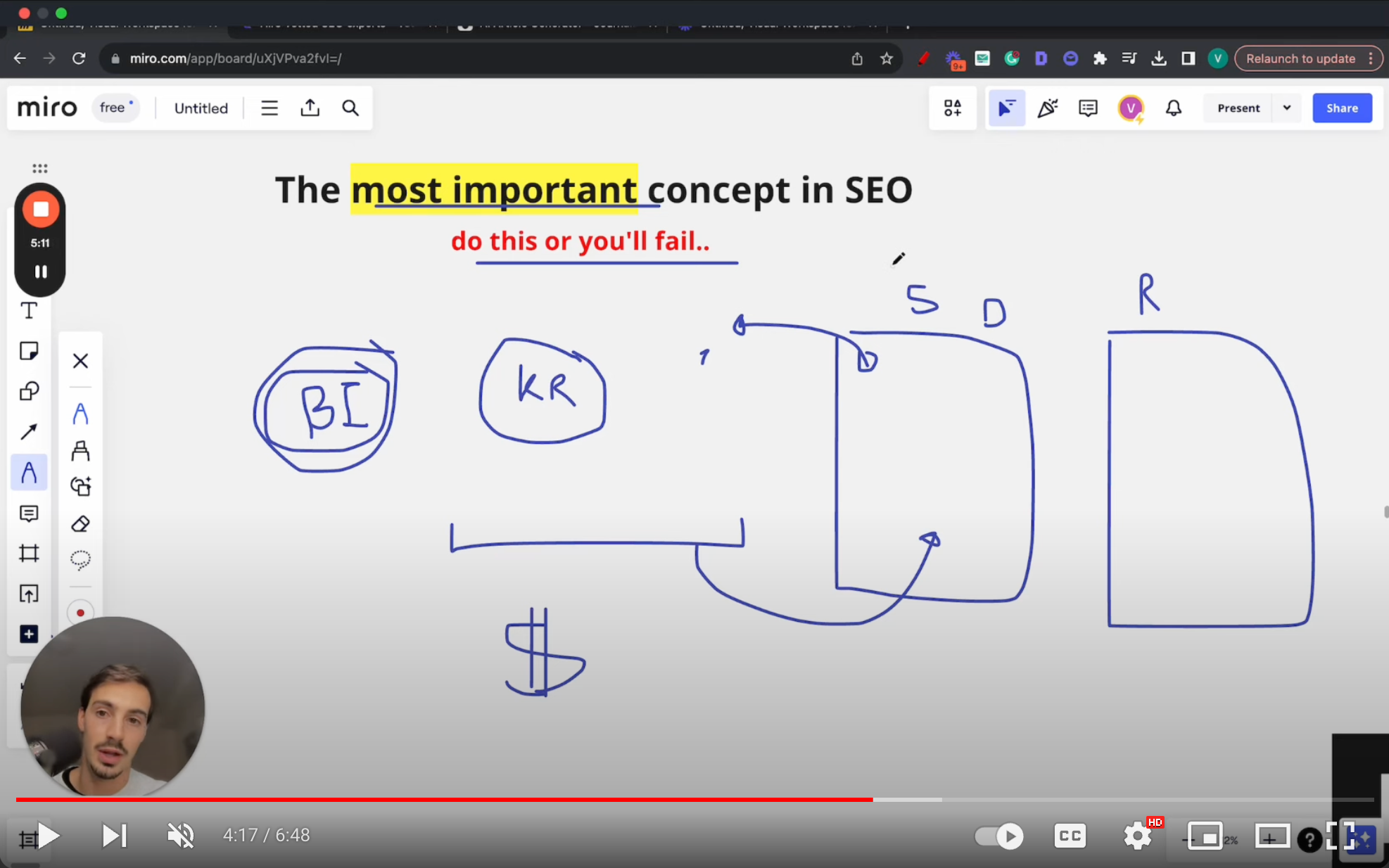
Off-page SEO and Building Backlinks
Now you have the technical SEO best practices in place, On-page SEO handled, and know what Keywords you want to target, it's time to focus on Off-page SEO (i.e. backlinks).
Link building is a complex subject, and there's a lot of nuance to it. That said, the three main things you need to know are:
- Quality over quantity (every time)
- Replicating your competitor's backlinks is a good strategy
- You can buy backlinks (it's faster) or acquire them organically (slower)
If you want to develop a proper link-building strategy leverage an SEO marketplace like Vettted.
Using AI Writing Tools to Wrap it Up
How to actually leverage AI for your SEO efforts? Well...it's quite simple.
The findings of this case study show that AI content is as good a strategy as manually written content for SEO. As long as you satisfy the user's search intent, it doesn't matter if the content was written but a robot or a human.
These results were all achieved with Journalist AI, while keeping in mind two simple concepts:
- Figure out what Google is valuing for certain keywords
- Produce better content for those same keywords that satisfy the user's search intent
After that, it's just a matter of repeating the process over and over again.
The great thing about AI is it lets you iterate faster. The faster you're able to iterate, the faster you surpass the competition.
There's exactly how to do it.
"Should I Use AI for My Business?"
The short answer is, Yes.
The long version is: if you don't do it, your competitors will.
The reality is that AI has come to stay, and the ones that don't leverage this amazing technology and tools built on top of it, will be left behind.
People who leverage AI writing tools can skip ahead of the line. They can automate their content generation, publishing, and syndication.
Not only that, but they don't spend resources on time-consuming tasks such as keyword research, internal/external link building, sourcing of in-article images and videos, and other tasks that AI helps automate.
If you don't leverage AI you'll climb the steps on the image below one by one, if you're leveraging AI, you'll still climb them one by one, however, you'll start closer to the top:
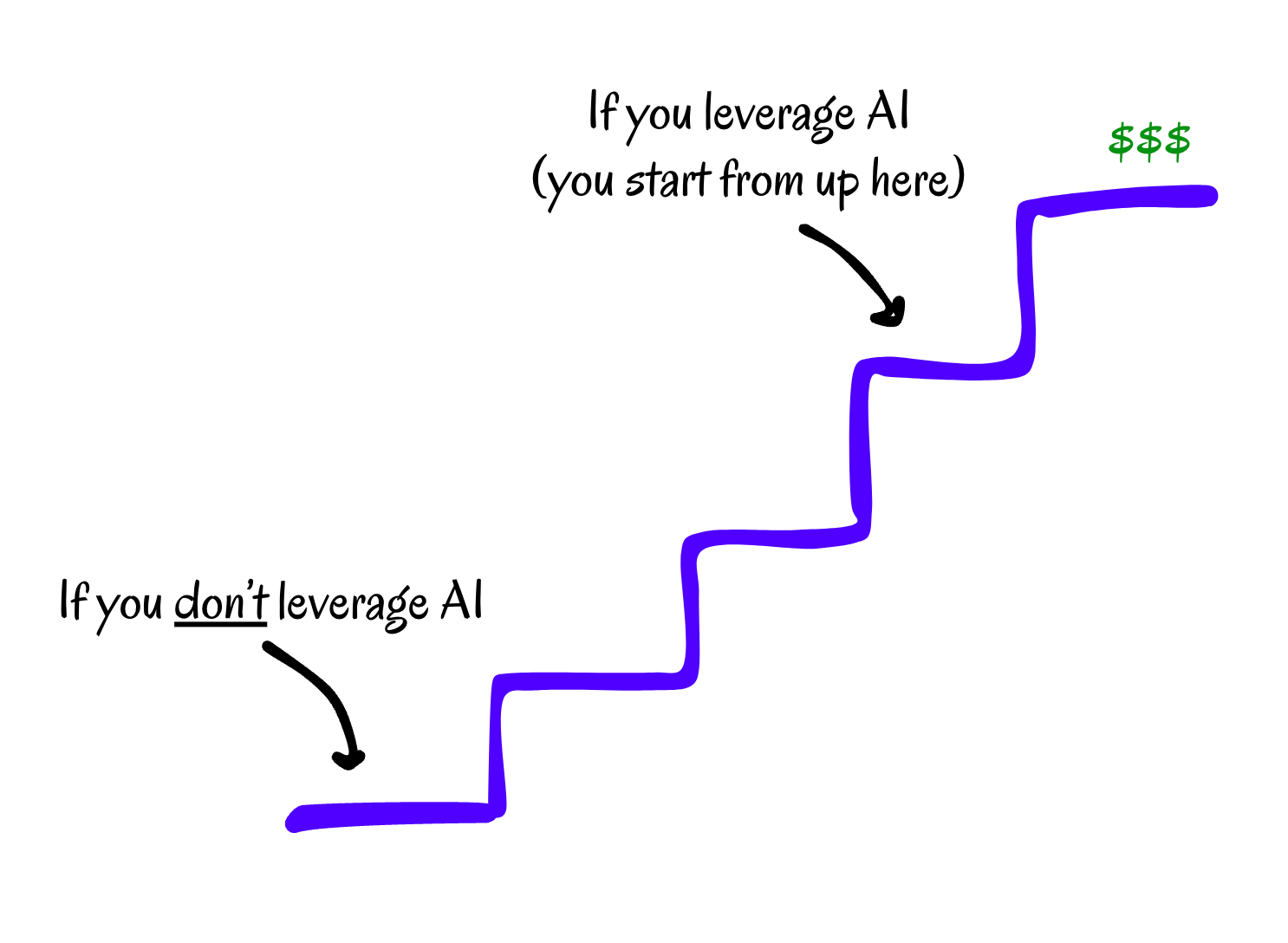
This is just one of our result-backed case studies. Click here to read this fintech startup AI SEO Case Study.